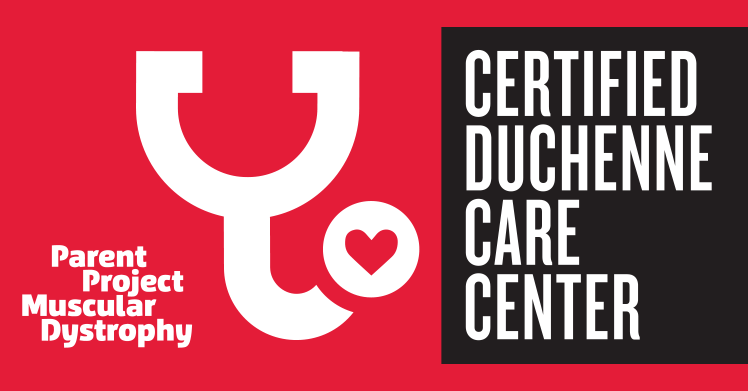
Today Parent Project Muscular Dystrophy (PPMD) named Children’s Hospital of Richmond at VCU (CHoR) the 26th Certified Duchenne Care Center (CDCC). This expanding certification program of elite centers, created in 2014 as part of PPMD’s Certified Duchenne Care Center Program, reviews and recognizes clinics nationwide for their outstanding neuromuscular programs.
The neuromuscular program at CHoR is led by Dr. Amy Harper and serves 60+ patients living with Duchenne muscular dystrophy. Since joining CHoR in 2016, she has built both a strong clinical and research program that includes comprehensive Duchenne care, clinical trials, and several clinical research studies investigating unique areas of Duchenne disease progression and management. With the addition of two more pediatric neuromuscular specialists, disease specific clinics and clinical research opportunities are rapidly expanding.
“Children, parents, and families are at the heart of what we do every day,” said Dr. Harper. “We’re honored to be recognized by PPMD, a group of dedicated parents and families, for our advocacy and innovation in the field of neuromuscular diseases.”
Kathi Kinnett, MSN, APRN, PPMD’s Senior Vice President of Clinical Care and director of PPMD’s Certified Duchenne Care Center (CDCC) Program celebrates Dr. Harper and her team at CHoR:
“Dr. Harper, in a short time, has built a robust program of both care and research in pediatrics, with Children’s Hospital of Richmond and is engaged in neuromuscular research across the lifespan,” said Kinnett. “CHoR has close collaboration with the other PPMD Certified Duchenne Care Centers in the area. Working together, these CDCCs are able to offer Duchenne patients and families access to most of the currently ongoing clinical trials. We are incredibly excited to add the expertise and compassion of Dr. Harper’s team to our growing network of certified clinics.”
PPMD’s Certified Duchenne Care Center Program supports standardized, comprehensive care and services for all people living with Duchenne. Certification means centers maintain the highest standards in clinical and sub-specialty services, rapidly apply new evidence-based knowledge, minimize heterogeneity in clinical research outcomes, and comply with standards in clinical care that were established by the CDC Care Considerations. As part of its ongoing mission to end Duchenne, PPMD continues to insist that all people with Duchenne receive comprehensive care.
Kinnett says that since launching the program in 2014, PPMD receives weekly inquiries from centers, both in the US and abroad, interested in applying for certification.
“Families in our community turn to PPMD to help identify the centers in the country providing the best in comprehensive Duchenne care and services. Clinics and clinicians are realizing the value of the Certified Duchenne Care Center Program and therefore strive to be the best facility they can be for Duchenne patients and families. Industry, also, is recognizing the value of including patients in their studies, receiving standardized Duchenne care and, thus, strengthening the outcome measures in their clinical trials. As the importance of a set of standards and guidelines in clinical care are recognized globally, PPMD looks forward to expanding this program internationally in the New Year by partnering with other patient advocacy groups. We also look forward to more certifications in the U.S. in 2019.”
To learn more about PPMD’s Certified Duchenne Care Center Program, visit PPMD’s website. Click here to learn more about the history of PPMD’s Certified Duchenne Care Center Program and to access PPMD’s first published article on the program.



 by: Parent Project Muscular Dystrophy
by: Parent Project Muscular Dystrophy

